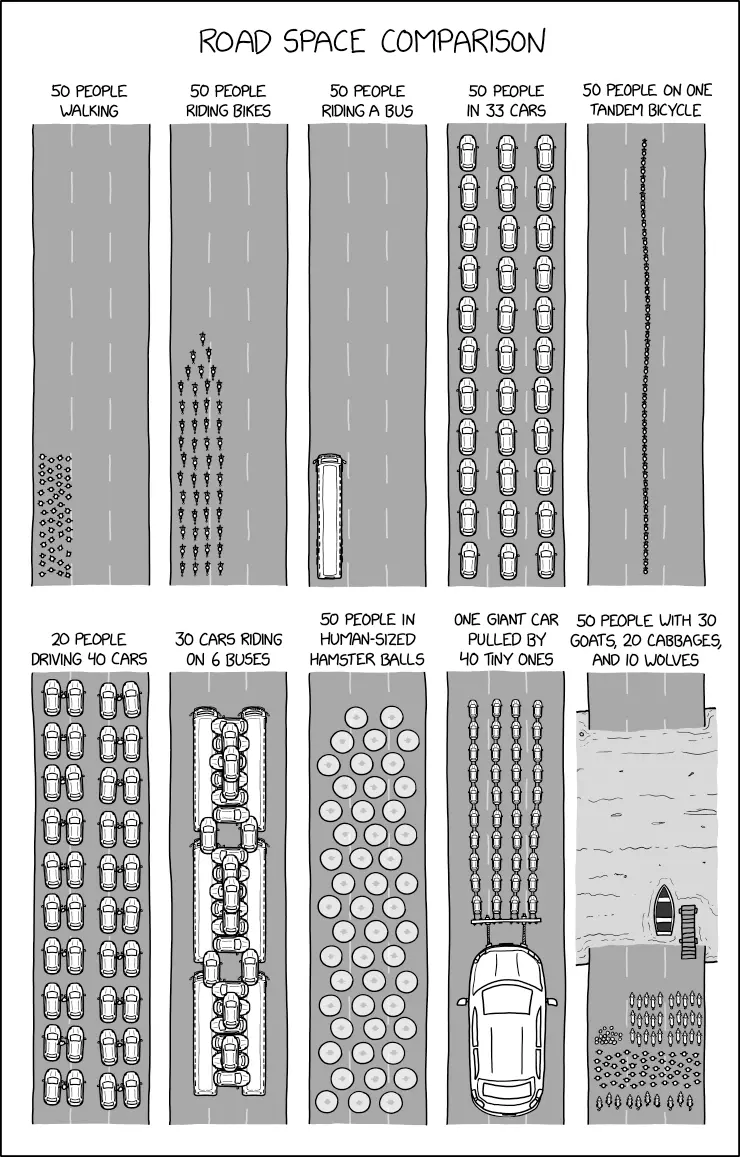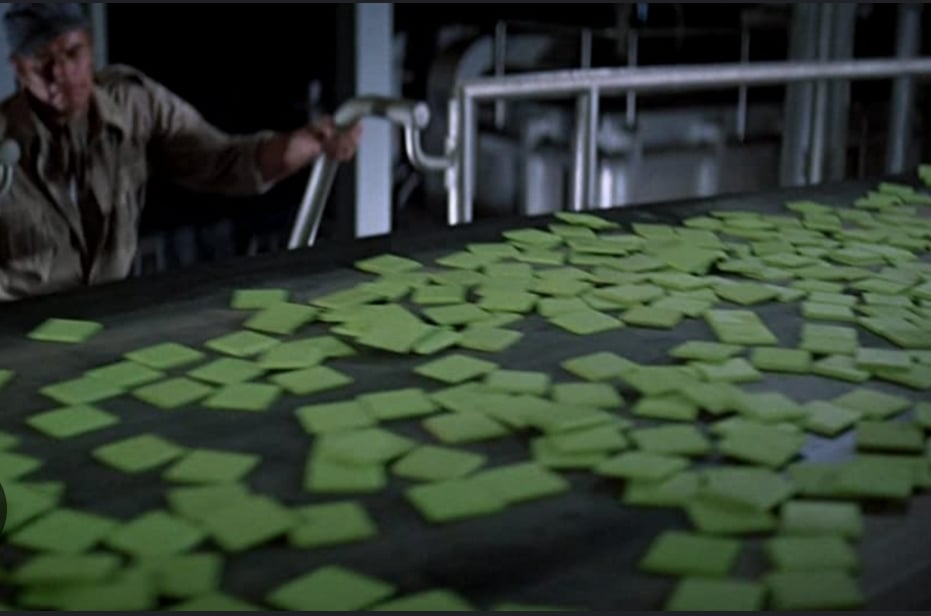Relevant xkcd:

A place to discuss problems of car centric infrastructure or how it hurts us all. Let's explore the bad world of Cars!
1. Be Civil
You may not agree on ideas, but please do not be needlessly rude or insulting to other people in this community.
2. No hate speech
Don't discriminate or disparage people on the basis of sex, gender, race, ethnicity, nationality, religion, or sexuality.
3. Don't harass people
Don't follow people you disagree with into multiple threads or into PMs to insult, disparage, or otherwise attack them. And certainly don't doxx any non-public figures.
4. Stay on topic
This community is about cars, their externalities in society, car-dependency, and solutions to these.
5. No reposts
Do not repost content that has already been posted in this community.
Moderator discretion will be used to judge reports with regard to the above rules.
In the absence of a flair system on lemmy yet, let’s try to make it easier to scan through posts by type in here by using tags:
Relevant xkcd:

50 people pureed and pressed into high-protien calorie-dense tiles:

It's always relevant!
Hilarious 🤣!
Imagine seeing 69 random strangers walking down the street, densely packed in like that, for no reason. Just comin at you.
A lot of those "highway programs" include things like removing barriers to aquatic organism passage, reducing congestion and emissions from the movement of cargo, and other things that don't suck. It's still weighed too heavily in favor of cars and highways for sure, but there's more getting funded by the IIJA & IRA than just, like, freeways.
Are you not into ~~trains~~ trams?
Does that make him tramsphobic?
We can't be all trampholic (wait, why not?)
That's WRONG! That's not how autonomous cars work!! They are AUTONOMOUS that mean you can get rid of (at least!) half the people and still have as many cars!
TBF US highways are undermaintained and a collapse could endanger lives.
I'd rather have a railway expansion but we still gotta maintain whats been built.
While I'm a strong proponent of reducing and possibly eliminating car use, this image is disingenuous. They neatly packed 69 (nice) people into a medium bus, sure. But when showing cars, it's almost 1 persons per car (I counted 15 cars in a row and there are 4 rows, so 60 cars). You can definitely use cars more efficiently than that.
Assuming that actually autonomous self-driving cars exist, they could be extremely efficient. Especially if you treat them like ride sharing taxis. In other words, a lot of people could share the same car and that would reduce the amount of owned cars. They also never waste space being parked. So I can see how when we make a real self-driving car, it can potentially reduce traffic. Especially for all those cases where public transportation doesn't work.
And what the heck is a "connected car"?
Two facts:
You can use cars more efficiently but by and large they aren't.
Also, you think people are gonna share a car? Fat chance. People would need to work out shared upkeep, time slots to have it, etc.
We simply need to stop subsidizing cars which is the whole point here.
Every panel is flawed
People don't walk that closely together
People don't bike that closely together
Only a double decker bus could fit that many people without cramming people in like sardines
Moving cars should obey a safe following distance, so unless traffic is gridlocked, they shouldn't be that close either
Bikes even if not packed as closely massively decrease the total volume. Even if they were all riding all after one another on a bike lane it would be miles shorter than cars on a road.
And as for the bus... I have been on busses that full. You clearly have not travelled peak hour traffic on a busy route. Just look at any Japanese or Indian train to see how space efficient they are able to transport petiole
Things being close together isn't really an issue here because it's just meant to visualize the volume. They are not trying to paint a realistic scenario, I don't think.
I'd argue against that.
The concept of robot taxi sounds nice, but it devolves into an unsustainable mess. Ride sharing isn't simple, especially when we talk about uncertain way points. Meaningfully matching cases where people can share a robot car with completely random drop off is a logistical nightmare. I used to work at a Ride hailing company as an analyst, and people being unhappy with the duration of the shared ride was the biggest issue for that category (removing for generic cases like payment issues).
Additionally, I'm sure it's going to be a safety factor. I'm unlikely to get into a car with a random stranger when there's literally no one else in the car. Miss me with trusting some corporate with safety in such cases.
Thinking of riding a bicycle so close to others at any speed scares me a bit.
Doing 50 that close to other cars would also be very uncomfortable.
Explain to me how you solve the mass transportation issue in non metro areas. I live in Montana, where cities are an hour or three apart by vehicle, but even in said cities, outside of the main commercial areas, people are spread out. Like, really spread out. There is a single bus stop eight blocks from my house, with exactly four scheduled pickup/dropoff times. My kids go to school with other kids who live twenty miles away. Commercial rail doesn't exist, except for a single cross-country Amtrak line with a station four hours away from here.
Images like this are illustrative, but they completely ignore the physical reality of how vast swathes of the US are laid out. You can't just flip a switch and have bus stops on every corner and rail lines connecting your major cities and residential areas. That's a massive undertaking that would cost way more in up front infrastructure than maintaining and augmenting existing highway program already does.
How do you change the culture away from cars where there is literally no realistic way to do it for 99% of people in areas like this? And how do you push for infrastructure change when there is no anti-car culture? It's a chicken and egg problem where you have no chickens and you have no eggs.
Even the most remote area has some sort of gathering points that can be concentrated into a walkable area. Basically - when you drive your car to church, you should have the option of walking to a brunch place and a grocery store, picking up your niece arriving on Greyhound, and yelling at your local councilman, before driving back. You should have the option to do more with fewer trips
Oddly enough, rail served more rural communities earlier on in the 20th century than they do now. This is due to disinvestment and the prioritization of personal vehicles. So not only is transit realistic, but it was the way for many railroad towns to be connected to each other and the rest of the country. Obviously that’s historical evidence, life is more complex now, but things can still be made to work with transit. Increasing bus frequency and coverage sounds like it would help your community.
Well you already expressed how to solve it. Issue is we have to think of a strong bus service and train service as a proper service rather than a for profit business. We can do it just we won't.
Montana is around 147k square miles large it costs $1-2 million per track. We could cover every square mile of Montana for $147 billion which is half of the aid we have sent to Israel since it's existence or 1/10 of our military budget. For $10 billion you can have train tracks every 15 square miles. For perspective there is 73k miles of public road in Montana supposedly.
If we brought all our troops back to the USA and used them as manpower and spent our military budget on infrastructure we could have 7 million miles of track laid in the last 10 years. For perspective we have 4 million miles of road in usa by quick glance.
The issue is solved at scale in cities. There is no need to change rural centers at the moment until the pressure is relieved where it will have the most effect. Maybe even freeing tax dollars for the state to help with rural areas instead of millions of intercity roads being damaged daily by large vehicles. Every dime you save in the city can be subsidized for rural areas if it is no longer needed. Or can be used to further assist struggling populations in the city. Everything that benefits people will find its way to also benefitting you in some way.
Hey fellow Montanan! Check out Big Sky Rail Authority's arguments for implementing a southern passanger rail service, or think of the benefits of increased bus service connecting the larger Montana cities. We have main travel corridors across the state that could be greatly improved by a public transportation network, linking rural communities and connecting them to larger city centers. Combine that with local bus service, walkable communities, and biking infrastructure in places where it can be supported like Missoula, Bozeman, Billings, etc can improve traffic and livability of the towns. Also, think of the improvement to traffic conditions for people coming into town from surrounding rural communities if you can divert a good portion of traffic to public options. In a rural state like ours, there's always going to be some need for personal vehicles, but there's still lots of places where having more public transportation options could improve our communities and lessen our climate impacts. Sure, it's going to look different than in other parts of the country, but still a lot of room for improvement around here.
Why are the cars spaced but the walking humans not?
Uh, they're not? The cars are in fact much closer to one another than they could possibly be while moving at speed. They would only get this close to one another during a traffic jam. On the other hand, the walkers are entirely capable of moving in exactly the way they are pictured.
You haven't seen me walk buddy...
If you've ever tried to drive a car you'll discover that you need to keep a relatively large distance between other cars, particularly when moving at high speeds in order to avoid crashes.
By contrast, when you're moving through a crowd, you can get practically on top of someone else without risk of bodily harm.
Not me. I wear a Colin Furze style carrot slicer belt at all times. Watch a motherfucker try to ope right by me. Bitch gonna get cut.
The cars and walkers are both as close as they can safely be while moving?
Not sure where you drive, but those cars aren't spaced at all- they're very close to bumper-to-bumper, which you can only do at extremely low speeds that unrealistic for travel. Meanwhile, the people that are bundled together ARE actually capable of moving like that, though the average american (who has a larger 'personal bubble' that other cultures) would probably not like it.
Moreover, the car example could actually be worse than it appears- because they're taking up all lanes of a road, so you're assuming they're coming AND going, which none of the other examples are assuming. If you did it properly, the line of cars would be two wide and twice as deep!
69 people, eh?